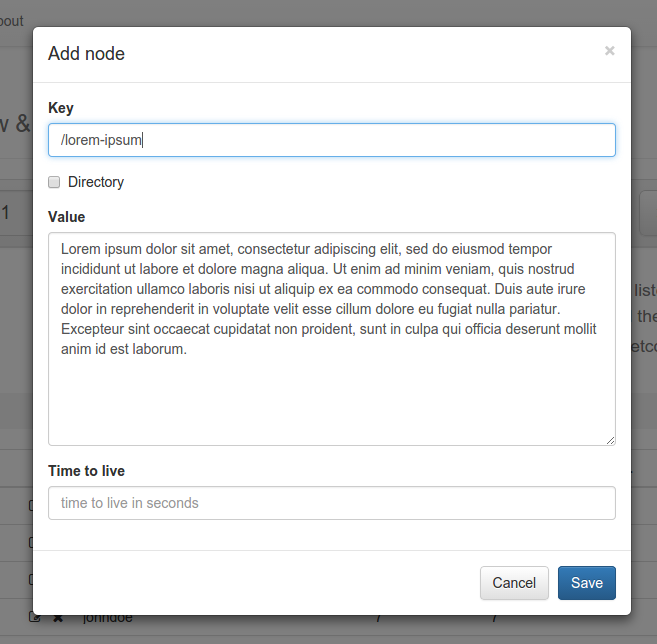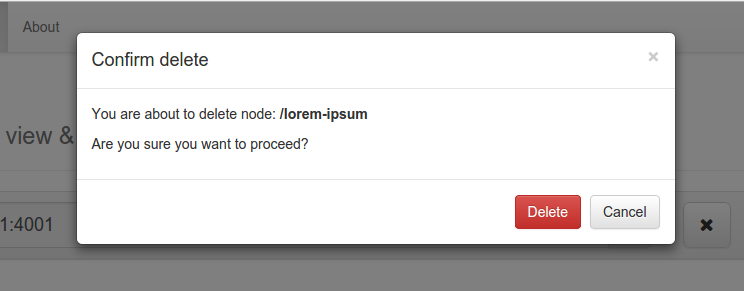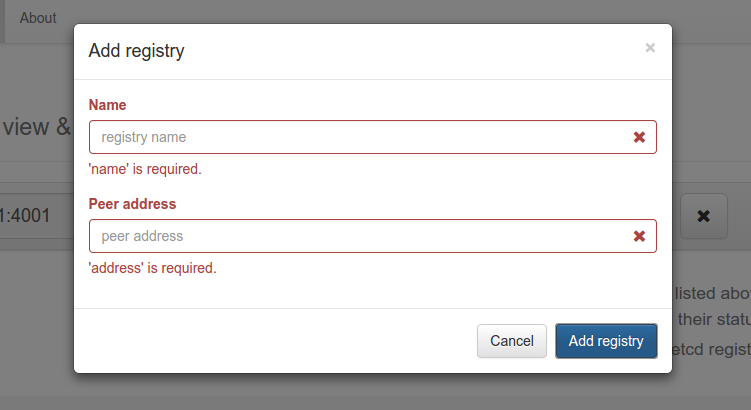Awesome
etcd-viewer
The etcd-viewer is a java web application that allows you to navigate and modify etcd distributed key-value stores.
The application uses the etcd rest API to communicate with the underlying key-value store.
Getting Started

Run with docker
The easiest way to get etcd-viewer is to run a docker container with the etcd-viewer image:
docker run -d -p 8080:8080 nikfoundas/etcd-viewer
The docker container will deploy the etcd-viewer war file to a jetty servlet container. The docker image is built on top of the jetty:latest image.
Build etcd-viewer
In order to build etcd-viewer you need java-1.8 and maven 3.0.5 or later.
- Clone the etcd-viewer repository
git clone https://github.com/nikfoundas/etcd-viewer.git
- Build the project with maven
mvn clean install
-
Alternatively you can start the etcd-viewer with maven jetty plugin
mvn jetty:run
- or even build a docker image using the provided Dockerfile
docker build -t some-repo/etcd-viewer .
Embed components within your wicket application
If your application is built with wicket you can also use the components - panels from etcd-viewer to embed the browsing - editing functionality in your application.
Features
Supported etcd API
Etcd viewer supports the following actions via the etcd rest API:
- Get version
- Get node self statistics which contains the leader information
- Retrieve machines that participate in the etcd cluster.
- Create directories and key-value pairs with optionally providing time to live (TTL)
- Retrieve directories and key value nodes
- Update key-value pairs
- Delete directories recursively
- Delete key-value pairs


Multiple etcd key-value stores
You can navigate and modify multiple etcd key-value stores without having to run the application more than once. The etcd clusters are stored in memory and they are forgotten after the application is restarted.
You can add and remove etcd key-value stores at any time. Removing an etcd registry from the etcd-viewer does not affect the contents of the registry itself.

Leader auto detection
In order to add an etcd cluster registry you only need to provide one alive etcd host. The application discovers the rest of the cluster hosts and detects the leader node. All reads and writes are then directed to the leader node to avoid redirections.
Etcd cluster monitor
Etcd viewer enables you to view the machines that participate in the etcd cluster along with their status - leader or follower. If some etcd host is not accessible then it is marked with red to indicate that it is down. Note that for single node etcd registries no status is reported by etcd.

Responsive css
etcd-viewer uses bootstrap css framework to enable key-value
storage accessibility even from mobile devices or tablets.

Next steps
- Provide feedback on communication or etcd api errors (partially done)
- Provide log console to record modifications applied
- Extend functionality to view and modify fleet unit information
- Use thread safe CXF jax-rs api (done)
- Support client side basic authentication for etcd with authentication enabled. Check etcd auth api. (etcd 2.1.x and later)
- Support user and role management (etcd 2.1.x and later)
- Provide documentation and hooks to import etcd client certificates
About
etcd-viewer uses the following open source libraries and frameworks:
- Apache wicket 6.19.0: Open source Java web framework
- Apache CXF 3.0.1: To handle the etcd rest API
- FasterXML Jackson 2.5.3: To marshal/unmarshal JSON objects to POJOs
- Google Guice 3.0: For dependency injection
- Bootstrap 3.3.4: Responsive CSS framework
- jQuery 1.11.2: Open source JavaScript library
- FontAwesome 4.3.0: Iconic web font

License
etcd-viewer is released under the Apache 2.0 license. See the LICENSE file for details.
